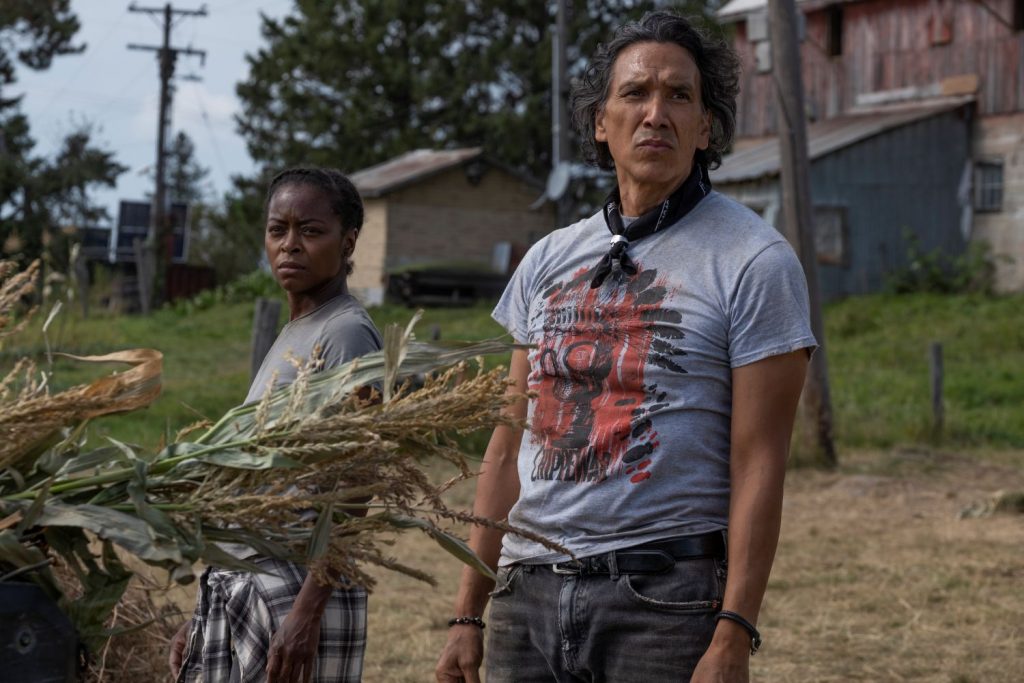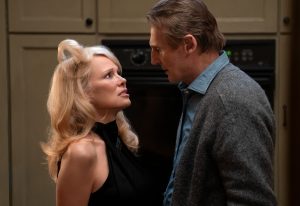Reviews include Russians at War, Nobody 2, and Sweet Angel Baby.
TFCA Friday: Week of July 4
July 4, 2025

Welcome to the TFCA weekly, a round-up of reviews and coverage by members of the Toronto Film Critics Association.
In Release this Week!
40 Acres (dir. R.T. Thorne 🇨🇦)
***2024 TFCA Awards nominee: Best First Feature***
“In focusing on characters thriving and equipped to handle difficult situations, the family often operating with military-style precision, Thorne constructs an exhilarating work that keeps viewers on the edge of their seats,” writes Courtney Small at Exclaim!. Small also chats with director R.T. and star Michael Greyeyes about bringing this vision to life. “I don’t know about you,” Thorne tells Small, “but when you sit around my family table and start talking with extended family, you get all types of conversations about religion, politics and social things…Oftentimes thrillers are just about the visceral thrills…I think deeper conversation can be had, different perspectives — especially if you’re committed to these people.”
“40 Acres is a masterful cinematic exploration of events in rural Canada – shot in Sudbury – during a violent civil war and a fungal pandemic that wiped out 98% of the animal biosphere,” notes Anne Brodie at What She Said. “Thorne’s visually appealing and exciting film has it all, power, intelligence, beautifully detailed, diverse characters, dreamlike qualities and authenticity for this excellent tale. There is danger, quick thinking and action galore, sure, but Thorne’s empathy comes through. The score is arresting and battle scenes are staged in a spellbinding, balletic manner. 40 Acres is a fully realised, striking even challenging creation and one of the best films around.”
“40 Acres takes the best of the likes of Carpenter and Romero and sprinkles in some genuine cultural and societal relevance in this familiar yet wholly original yarn. R.T. Thorne has laid his claim to being a self-assured filmmaker that isn’t afraid to combine the best of all worlds to give audiences something both entertaining and intellectually engaging,” says Dave Voigt on In the Seats with, while interviewing director R.T. Thorne. “We had the unique pleasure of sitting down co-writer/director R.T. Thorne about so many of elements at play in this film, the freedom allowed in genre cinema, working with Danielle Deadwyler and about being a storyteller that isn’t afraid to spark conversation and entertain, all at the same time.”
“[A] riveting and fiercely political thriller as poignant as a T.S. Eliot poem and as gory as a George A. Romero flick,” says Barry Hertz at The Globe and Mail. “Its set pieces are big, bloody affairs – there might be more slayings onscreen here than in the entire history of Canadian cinema (save the Tax Shelter era, which was ripe with cheap slashers). But Thorne and his co-writer Glenn Taylor’s themes are also enormous in their scope and layers, with the story taking aim at everything from the painful legacy of colonization and dispossession to the wounds of generational trauma.”
“Themes and subtext regarding land grabs, oppression, toxic capitalism, and Wendigo mythology penetrate every inch of 40 Acres, lending the thriller aspects a much more globally impactful and deeper meaning than if the material were played strictly for theatricality and shock value,” writes Andrew Parker at The Gate.
“Deadwyler plays Freeman with fierce, often frustrating, single-sightedness. We might be able to relate to her determination to keep her family alive, but it is less likely we will find ways to actually like her,” notes Thom Ernst at Original Cin. “For all its reflective history and pointed socio-political commentary, 40 Acres is first and foremost a vivid and wildly entertaining action film. The opening sequence—sensationally staged within the twisting maze of a cornfield—pushes viewers to the edge of their seats before they’ve had a chance to settle into them. Though it stops short of horror, 40 Acres carries the haunted spirit of a dark thriller.”
“With regards to production values, the film, being shot in rural Ontario, passes as credible dystopian surroundings,” writes Gilbert Seah at Afro Toronto. “There are lots of forests and trees to suggest an enclosed and hidden farmland. But the film strains for the audience to feel sympathetic, less root for this dysfunctional family, due largely to the stubbornness of each family member.”
“Greyeyes, who delivers a nuanced performance as the patriarch Galen, described his experience on the film as ‘so gratifying and so powerful,'” writes Marriska Fernandes at CBC Arts. “He pointed out how the film’s themes connect to the historical reality that ‘land equals wealth,’ the broken promise of land to Black populations (the infamous ’40 acres and a mule’) as well as the complex land history of Indigenous peoples in Turtle Island. ‘When you’re landless, you don’t have power,’ he said. But 40 Acres boldly subverts these historical power dynamics. In a deliberate reversal, the Afro-Indigenous family, who own the land, are depicted as the most powerful and successful people in the region.”
“R.T. Thorne announces himself as a directorial talent to watch with this film. A veteran music video and TV producer and director, including notably the award-winning drama The Porter, Thorne knows how to pace and shoot everything from action scenes to dialogue driven family dinners,” says Marc Glassman at Classical FM. “The film is consistently lively and entertaining, with a cast—from neophytes to old pros—acting with consistency and authenticity.”
Daniela Forever (dir. Nacho Vigalonda)
“But even if viewers can see where Daniela Forever is heading in advance, the weight and gravity of the situation is easy to identify and lands with confidence,” says Andrew Parker at The Gate. “By design, Daniela Forever is a movie that could only end with everything coming apart at the seams. The grief that Nick experiences branches outward and creates a sense of greater catharsis, even if things are left somewhat bittersweet. Loss is a neverending cycle. Things get worse before they get better and before they get worse again. But as a film, Daniela Forever stays great throughout.”
Dear Ms.: A Revolution in Print (dir. S. Koroma, A. Gu, C. Aldarondo)
“These chapters merely provide three stories among many, but they’re a fitting encapsulation of the Ms. legacy. Koroma, Gu, and Aldarondo admirably give Ms. credit for both reflecting and shaping essential conversations,” writes Pat Mullen at POV Magazine. “The doc does away with rose coloured glasses while asking how publications stay true to their editorial integrity in a challenging field, all the while straddling voices of objectivity and advocacy. As the founding members of Ms. note throughout the documentary, many of the conversations from early issues remain at the forefront of conversations today, feminist or otherwise. While Dear Ms. pens an appropriately celebratory note, it holds a level of cautious optimism by understanding that there’s always going to be another letter to add to the story.”
Heads of State (dir. Ilya Naishuller)
“What’s most distressing about Heads of State, though, is what it portends for Cena, who should by this stage in his career be top-lining the biggest of studio blockbusters, just like his character in the film once did,” notes Barry Hertz at The Globe and Mail. “Between this, 2023’s similarly trashy-in-a-bad-way Freelance, and half a dozen other easily forgettable genre efforts, Cena seems intent on becoming the biggest movie star to disappear entirely into the streaming-world void. You’ll see his name, you’ll recognize his face. But you won’t watch his movies. Not really.”
“A high concept action thriller where the top elected officials of two of the world’s most powerful countries have to be actual heroes rather than politicians who talk a good game, Heads of State never overthinks things and dives headlong into full on romp territory,” says Andrew Parker at The Gate. “It’s not a perfect film, but given the current state of the world, this reality is preferable to the one we currently inhabit.”
Inedia (dir. Liz Cairns 🇨🇦)
“This is really a thoughtful piece of cinema that takes a look at the societal need to really be kinder to one another as no one person truly knows what is going on in the journey of another and it deftly plays with the ideas of how we actually don’t know nearly as much as we think we do especially when it comes down to our friends and even our family,” says Dave Voigt at In the Seats with… in an interview with the film’s star. “Star Amy Forsyth really tears into the emotional uncertainty of her character and it is a magnetic thing to watch, we had the pleasure of sitting down with Amy to talk about the nature of the project, the emotional challenges of the character, the collective need for us all to be a little nicer to one another and finding your way through the tall grass of being a working actor in North America.”
Jurassic World: Rebirth (dir. Gareth Edwards)
“But there are only so many ways for dinosaurs to attack — basically tooth or claw. And so, this instalment mostly feels like new people in the same old situations…The new dino on the block — because every chapter in the franchise needs one of those — is something called D-Rex, which a quick Google informed me was short for Distortus Rex,” writes Chris Knight at Original Cin. “But this is the problem with a movie series which wore out its welcome as far back as 2001’s Jurassic Park III. It’s not the hottest of takes to note that the hubris and greed that were the subject and moral of the very first movie have since become the defining ethos of the franchise.”
“After a dreadful pair of overstuffed, world building legacy sequels, it’s refreshing to see that returning writer David Koepp (coming back to the series after penning the original 1993 landmark effort and The Lost World) and new director Gareth Edwards (the exceptional 2014 Godzilla, Monsters, Rogue One) have decided to make Jurassic World: Rebirth into a stand alone adventure,” writes Andrew Parker at The Gate. “It’s still overstuffed, clunky, and averse to basic human logic, but it also has a lot more entertainment value than the films that followed the first Jurassic World and moves the series back to its suspenseful and intense roots.”
“The action set pieces are ok, some genuine thrills are present, which should be expected, but the entire film, running over two hours is a tiresome process indicating clearly that the filmmakers have run out of ideas,” sighs Gilbert Seah at Afro Toronto.
“Quickly, history’s stupidest cruise not involving someone named Gilligan runs into Loomis and Bennett’s mission, and from there, it’s just a matter of watching the clock until someone gets chomped in half,” observes Barry Hertz at The Globe and Mail. “Gareth Edwards, a long way from the sci-fi highs of 2023’s artificial-intelligence-baiting thriller The Creator, seems to be in pure director-for-hire mode here, desperately trying to root Koepp’s shiftless script in a world that feels both real and fantastical. But so many of Rebirth’s images and set pieces are lifeless, and no amount of on-location filming in Thailand – versus the soundstage green screenery so favoured by most of Jurassic’s blockbuster contemporaries – can hide the fact that very little in the screenplay makes logistical, narrative or emotional sense.”
“The strangest and most regrettable thing about this film is how ordinary the special effects are. The CGI used in Jurassic World Rebirth isn’t appreciably better than what we saw in Jurassic Park, and may actually be worse. The dinosaur chase scenes frequently look fake – the beasts are almost always just one chomp away from their prey – and even the inevitable rampage by Distortus Rex, D-Rex for short, has a been-there, stomped-that feel about it,” writes Peter Howell at the Toronto Star. “After acknowledging the loss of awe for dinosaurs at the outset of the picture, Edwards and Koepp do nothing to revive it.”
The Old Guard 2 (dir. Victoria Mahoney)
At the National Post, Marriska Fernandes, says Uma Thurman “has a newfound sense of calm, a tranquility she confesses she’d never experienced before. Her return isn’t just a nostalgic echo of past glories, it’s also a reminder of her enduring talent.” Fernandes chats with the star about her overdue return to action movies: “I wanted to bring to Discord the same thing I always try to bring to characters, which is humanity. She’s kind of tortured and twisted and dangerous, but she’s coming at it from a slightly broken but passionate once-human heart. What I liked about the first film is that all of the characters were really quite relatable, less so the villain. And I thought in this case that she would be serving the piece best if she was more relatable as a sort of tortured human.”
“The action set pieces are well shot, but the film is a complete mess in terms of narrative and logic,” admits Gilbert Seah at Afro Toronto. “No one even cares about these immortals or mortals especially they switching from one from to another.”
Shark Whisperer (dir. Juan Oliphant)
“Shark Whisperer is an insightful, educational and occasional uplifting film on sharks, covering both sides of Ocean Ramsey’s story,” notes Gilbert Seah at Afro Toronto. “The doc should be seen with Rob Stewart’s Sharkwater for the message these two films out forward.”
Sorry, Baby (dir. Eva Victor)
“Sorry, Baby, the feature debut of American writer-director Eva Victor, who also stars, is a clear announcement of an original new talent able to create highly inventive visuals with a limited budget. It is also a terrific — and sad and funny and contemplative — testimony about how trauma profoundly stains people’s lives, with far-reaching and unpredictable outcomes,” writes Kim Hughes at Original Cin. “The audience is given time to examine features and expressions as if in real life. That’s deployed to great effect in Sorry, Baby’s tender denouement, which gives the film its title and is heartbreaking and life-affirming all at once.”
“In one of the most exciting Sundance debuts I can recall, Eva Victor writes, directs and acts in a time-shifting story that balances deadpan humour with acute pain. ‘Something pretty bad happened to me,’ says her protagonist, Agnes. She’s a traumatized grad student and new prof on a journey of healing with no signposts or calendar,” writes Peter Howell at the Toronto Star. “The story is expansive; its humanist lens, however, is tightly focused on Agnes and those close to her. Co-stars Naomi Ackie, Lucas Hedges and Kelly McCormack also excel, but this is Victor’s glorious moment.”
“A great deal of Sorry, Baby comes with a dark sense of humour that cuts through the tension. A lot of that is of the ‘laugh to keep from cracking up’ mentality, but it’s humour nonetheless. It allows the viewer to be more at ease with the discomfort, and to process the deluge of feelings Agnes experiences all the time,” notes Andrew Parker at The Gate. “It’s a movie built on depression and trauma induced irritability, but also something that has moments of lightness to cut through all the doubt and uncertainty. It’s a film that comes from the heart, moves with gut instinct, and has a lot of brains.”
“The film is structured in chapters with the shattering event occurring in a flashback approximately a quarter of the way though the film. Trust me—it works well that way,” says Marc Glassman at Classical FM. “We see Agnes as she is now—still coping years after her trauma but somehow making her way forward. It shows how life changing such a moment of abuse can be. You can survive it but in many ways, it never goes away. Near the end of the film, Agnes has a panic attack while driving her car and has to pull off the road near a sandwich shop. She’s talked down by a random middle aged man wonderfully played by the character actor John Carroll Lynch. She explains that she was attacked but it was three years ago. He looks at her and says, ‘that’s not that long ago.’ Indeed, it isn’t.”
“Sorry Baby is billed as a dark comedy. Dark it is and a comedy it is, though the jokes are not really funny enough,” says Gilbert Seah at Afro Toronto. “When a comedic script fails to generate laughs, one can usually blame the director for his or her lack of a sense of humour, as comedy means timing, and a director needs to know how comedy timing works. Still, this indie film feels like one and has a certain freshness to it, making it likeable and entertaining, satisfactory.”

File Under Miscellaneous
At The Globe and Mail, Barry Hertz reports on the announcement that Cineplex CEO Ellis Jacob will retire: “A longtime veteran of the Canadian theatrical industry, the Calcutta-born Jacob got his start in the sector in the late 1980s at Cineplex Odeon Corp., then led by Garth Drabinsky and Myron Gottlieb. Since then, he has ridden the various waves of Canada’s ever-shifting exhibition landscape, sticking with Cineplex Odeon through its merger with the U.S.-based Loews in the late ’90s before joining Alliance Atlantis Communications,” writes Hertz. “After securing backing from Onex’s Gerald Schwartz and top Canadian film industry leaders Robert Lantos, Victor Loewy and Michael MacMillan, Jacob founded Galaxy Entertainment, which focused on building multiplexes in mid-size Canadian markets. In 2003, Galaxy merged with the Canadian assets of Loews Cineplex, with Jacob becoming chief executive of the new entity, Cineplex Entertainment, in 2003.”
At the Toronto Star, Peter Howell picks some summer highlights to look forward to, including the return of Yorgos Lanthimos’s breakthrough feature Dogtooth: “Greek auteur Yorgos Lanthimos is best known for Oscar-winning satires Poor Things and The Favourite, but his cultish second feature from 2009, returning to screens in a 4K restoration, is the one that haunts me,” writes Howell. “[T]he Fox Theatre is showing it July 11, 12 and 16, the Revue Cinema on July 14. The spanking new 4K restoration will make it even harder to look away from some of the film’s more out-there moments.”
At POV Magazine, Pat Mullen looks at the Fred Wiseman retrospective running at TIFF Lightbox: “For me, Wiseman’s best films come in his later act that observes the machinery of artistic institutions. That branch of the Wiseman oeuvre is represented in the Body Politic by Ballet (1995), a hallmark of backstage filmmaking that takes audiences inside the American Ballet Theatre in New York. Ballet may be among Wiseman’s most visually appealing documentaries for its pensive scrutiny of the dancers’ bodies as they rehearse again and again leading up to the big performance,” writes Mullen. “It might not be the most widely praised of Fred’s works, but it’s the gem of the series for anyone who came to love Wiseman through his more recent films like National Gallery and Menus Plaisirs, or even his return to the stage in La danse (2010). It’s proof that, after spending five decades observing institutions, Wiseman became one himself.”
At the Toronto Star, Peter Howell spotlights Canadian horror, which will get a special series with Guillermo del Toro at TIFF this summer, and speaks with some of the directors whose films are among the series highlights. “Canadians excel at horror because our wintry climate keeps us inside for a good part of the year, and it’s in those introspective spaces where horror flourishes,’ Toronto writer director [Vincenzo] Natali told the Star. ‘That’s why all of the films in this program are so hermetic. They are dealing with horror that emerges from within.”
A Festival of Festival Coverage
At Variety, Jennie Punter reports on the full line-up announcement for Montreal’s Fantasia Film Festival: “Genndy Tartakovsky’s Fixed, from Sony Pictures Animation, an R-rated dog sex comedy bound for Netflix later this summer, will close Montreal’s Fantasia International Film Festival,” writes Punter. “At separate events, Tartakovsky (Samurai Jack, Hotel Transylvania) and composer Danny Elfman will be feted with a Cheval Noir Career Achievement Award. Elfman’s award event includes a special screening of 1993 classic The Nightmare Before Christmas preceded by the world premiere of Eddie Alcazar’s animated short Bullet Time, both scored by Elfman.”

TV Talk/Series Stuff
At The Globe and Mail, Johanna Schneller chats with upside-down stars Beverly Glenn-Copeland, Elizabeth Glenn-Copeland, and right-side-producer Sean O’Neill about their new series Caring Cabin and a lifetime of music: “‘I never felt like my music came from me,’ Glenn says. ‘I was just tuned enough for what was beyond me to be able to come through me.’ One morning, for example, he woke up speaking Italian, a language he’d never studied,” writes Schneller. “He wrote down the lyrics that had come to him – a song he called La Vita – and had a fluent friend confirm that yes, they were in perfect Italian. ‘By the end of the day I no longer spoke Italian,’ Glenn goes on. ‘It was sent to me because I was open to it.’”
At The Gate, Andrew Parker picks the 25 best series of the year so far, including North of Normal: “The remote setting (actually shot on location) and Indigenous perspective help to set North of North apart from similarly minded sitcoms, making it one of the best Canadian comedies ever crafted. With one season down and another on the way, this could be a show that will endure for a generation.”



